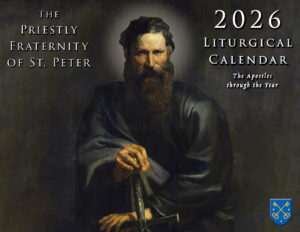Our Lady, Queen of Apostles
by Fr. William Rock, FSSP
In the traditional Roman Missal, there is a section near the back which contains Masses for “Particular Places.” Associated with feasts in their “Particular Places,” these Masses can also be freely prayed as votive Masses of the 4th class.1 One of these Masses is the Mass of “Our Lady, Queen of Apostles,” which is assigned to the Saturday following the Feast of the Ascension. This Mass can be seen as marking the days between the Ascension of Our Lord and the sending of the Holy Ghost at Pentecost, when, having returned to Jerusalem and the Upper Room where the Last Supper was celebrated, the Apostles and Disciples “were persevering with one mind in prayer with the women, and Mary the mother of Jesus, and with his brethren,” as it says in the Epistle for this Mass (Act 1:1-14). These nine days of preparation, which the Apostles and Disciples kept with Our Lady, was the first novena.
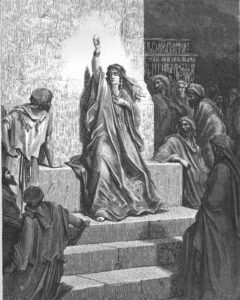
The Offertory Chant for this Mass of “Our Lady, Queen of Apostles” draws from the Book of Judges (5:3, 7-8). After the Hebrews, under the command of Josue, conquered the Promised Land and divided it by lot between the Tribes, there was not a centralized government, and there was not yet a king over Israel. Instead, the Tribes were to govern themselves following the Laws which God had given them at Mount Sinai. God Himself was to be the King of the Hebrews, and He would appoint certain chosen individuals to serve as judges over Israel in His stead and in His Name. These judges were usually military leaders for, if the Hebrews were unfaithful and worshiped the strange gods of those peoples of the Land whom they should have destroyed or driven from the Land, these peoples would subject the Hebrews to their rule, oppressing them. Worship strange gods and become subject to the people of those gods. When the Hebrews repented, God would raise up a Judge to deliver them from their oppressors.
At a time when the “children of Israel again did evil in the sight of the Lord…the Lord delivered them up into the hands of Jabin, king of Chanaan, who reigned in Asor: and he had a general of his army named Sisara,” (Jdg 4:1-2) there was “Debbora, a prophetess, the wife of Lapidoth, who judged the people” (Jdg 4:4). God, at this time, chose a woman, a prophetess, to rule His people. The Lord God commanded Barac, through Debbora, to lead an army against their oppressors. When Barac protested that he would only go into battle if Debbora went with him, she prophesied that “I will go, indeed, with thee, but at this time the victory shall not be attributed to thee, because Sisara shall be delivered into the hand of a woman” (Jdg 4:9). And this came to pass for the general Sisara was killed by a woman, Jahel. While he was hiding in her tent sleeping, Jahel hammered a tent stake through his temple (Jdg 4:21).
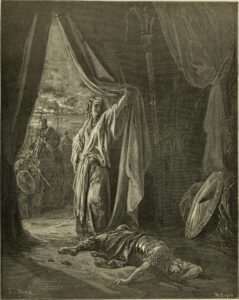
After the military victory, Debbora sang an inspired song. The Church draws from this song for the aforementioned Offertory Chant for the Mass of “Our Lady, Queen of Apostles:” “It is I, it is I who [quae] will sing to the Lord the God of Israel. The valiant men ceased and rested in Israel until a mother arose in Israel. The Lord chose new wars, and He Himself overthrew the gates of the enemies.”2 In the Latin, it is clear that it is a woman who is singing this song. In the historical context, it is Debbora who is singing. She sings of the warriors of Israel who did not engage with their enemies, who “ceased and rested,” until “a mother arose in Israel,” that is Debbora herself who rallied the troops and went with them into battle. They were victorious over their oppressors because it was the Lord Who called them to battle and Who was with them.
Figuratively, it is the Blessed Virgin Mary who sings these lines; she is the Mother who arose in Israel. For Debbora is a type, a prefiguring, or a foreshadowing of the Blessed Virgin Mary. Debbora was a mother in the Old Israel, and Mary is the Mother of the New Israel. Mary and Debbora are both prophetesses – “for behold from henceforth all generations shall call me blessed” (Luk 1:48). Debbora judged, that is, ruled over the Old Israel. The Blessed Virgin is the Queen Mother of the New Israel. Debbora lent her support in a military campaign, the Blessed Virgin supports her subjects, her children, in their battles against their enemies, the world, the flesh, and the devil.
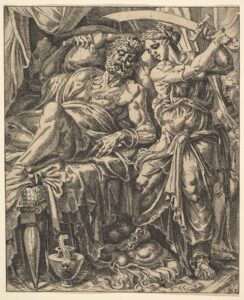
The valiant men can be seen as representing the Apostles, who “rested” in prayer with Our Lady, their common Mother, during these nine days of the Novena between the Ascension and Pentecost and then rose up and entered into the battle of founding and propagating the Church under the maternal gaze of Our Lady. For the Apostles were strengthened by the coming of the Holy Ghost so that they might “faithfully serve God’s Majesty and propagate by word and example the glory of His Name,” as the Church requests on behalf of her children in the Collect (opening prayer) of the Mass of “Our Lady, Queen of the Apostles.” For God Himself “overthrew the gates of the enemies” by the Passion, Death, and Resurrection of His Son.
The other woman mentioned, Jahel, who killed the enemy general by a blow to the head, can also be seen as a type of Mary. When enemies receive death at the hand of a woman in the Old Testament, the death comes from a blow to the head, for all of these valiant women, including Jahel, are types, foreshadowings of the Woman predicted in Genesis who will crush the head of the ancient serpent (Gen 3:15) – the Blessed Virgin Mary. Additionally, when Debbora was singing her prophetic victory song, which the Offertory quotes, she sings “blessed among women be Jahel.” Such a phrase was echoed by the Archangel Gabriel and St. Elizabeth when they said to the Blessed Virgin “blessed art thou among women” (Luke 1:28, Luke 1:42)
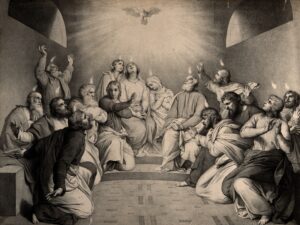
In the Communion Chant, the Church sings the following: “Blessed Mother and Immaculate Virgin, glorious Queen of the world, intercede for us before the Lord: for thou art the glory of Jerusalem, the joy of Israel, the honor of our people.” The closing words of this chant – “thou art the glory of Jerusalem, the joy of Israel, the honor of our people” – are taken from the praise given to Judith by the people after she delivered them from an enemy by killing their general by blows to his head (Jdt 15:10). Just like Jahel, Judith is also seen as a type of Our Lady – the heroine who strikes at the head of the enemy and saves her people.3
All of this should give us great confidence in Our Blessed Lady, for as great as were these heroines of old, so much greater is she whom they represent. Let us then, in these days leading up to the feast of Pentecost, imitating the Apostles, keep close to Our Lady in our prayers – indeed even by having this Mass prayed during the Novena when possible – so that we might be well-disposed to receive the gifts which God wishes to give us on this upcoming Feast of Pentecost. Then may we, like the Apostles, “faithfully serve God’s Majesty and propagate by word and example the glory of His Name.”
May Our Lady, the true Debbora, the true Jahel, and the true Judith, pray for us!
William Rock, FSSP was ordained in the fall of 2019 and is currently assigned to Regina Caeli Parish in Houston, TX.
- Additionally, according to the decree Cum sanctissima (n. 6), these Masses for “Particular Places” can be freely commemorated on their assigned days in the Masses (and Offices) of 3rd and 4th class days outside of their “Particular Places.”
- The translations of the Mass propers are taken from the Angelus Press 1962 Hand Missal.
- More information about types of Our Lady, including Debbora (Deborah), Jahel (Jael), and Judith, can be found here.
May 19, 2023








